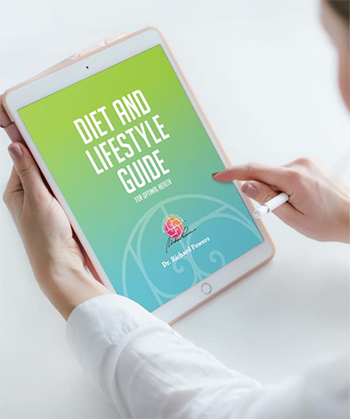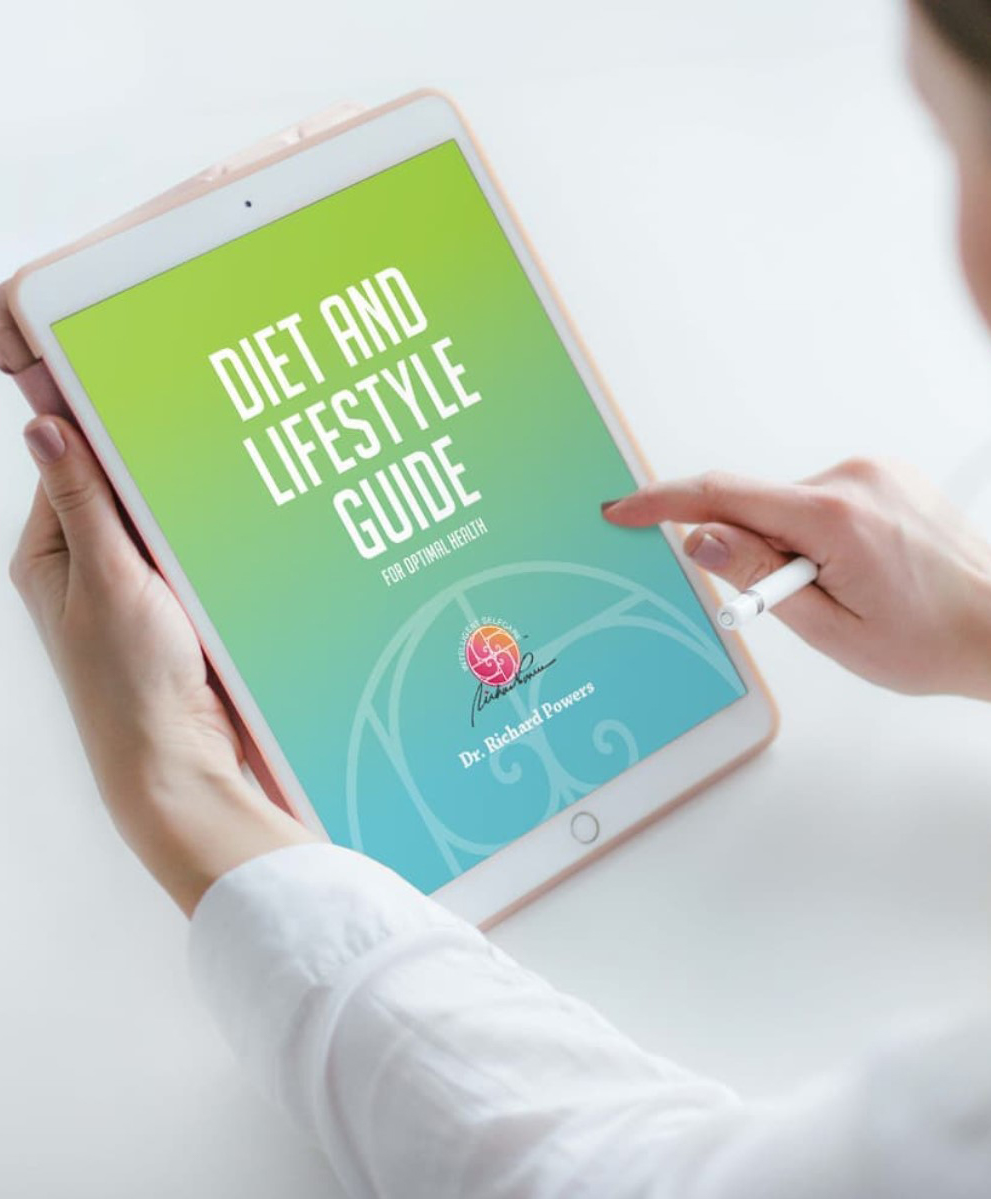
by Dr. Richard Powers
Healing, repairing, regeneration, and detoxification are accelerated during deep, restorative sleep.
To feel and function well and avoid a premature demise, you must get the sleep your body requires. If you follow the adage, “I’ll sleep when I’m dead,” you may get there sooner rather than later!
Research has proven that insufficient sleep significantly compromises our immune system, with compounding sleep debt opening the door to infection, cancer, and autoimmune disease.
Furthermore, without adequate deep, restorative rest, the brain cannot efficiently dump its trash, and the toxic residues left behind impair memory and cognition and accelerate brain degeneration and shrinkage (think dementia, Alzheimer’s, and more).
SLEEP TIPS:
For all these reasons and more, no effort should be spared to ensure a good night’s rest. Below are key hints to help you fall asleep sooner, stay asleep, and get better sleep quality.
Use low-blue-light glasses when viewing a TV, tablet, or computer after 7 p.m. as they block blue frequencies of light, which are emitted from electronic devices (similar to daytime sunlight) and signal the brain that it is daytime, thereby forgoing the triggering of nighttime physiology, including the release of melatonin.
Minimize caffeine and alcohol intake, especially after 7 p.m., as both are chronodisruptors (i.e., things that interfere with circadian rhythms and undermine restorative rest).
Block out all light in your sleeping room and consider installing blackout shades. Darkness promotes sustained melatonin secretion and, therefore, better sleep.
Turn off electronic devices at least 30–60 minutes before lights out – including TV, computer, tablets, gaming, phones, and other devices – as they stimulate the brain, making it difficult to fall or stay asleep and achieve deep, restorative (theta and delta) phases of sleep.
(Additional deep, restorative sleep guidelines are detailed within my book, Foundations for Creating Optimal Health: A Guidebook for getting and staying well.)
SLEEP AIDS:
Sometimes sleep aids may be beneficial to help you fall asleep, stay asleep, or get more restorative rest. There are many different types of sleep aids available but not all are effective nor safe.
Note that sleep aids act through various pathways in the body and it is difficult to ascertain which will be best for you. Therefore, a good strategy is to take steps to improve your sleep hygiene first (as noted above and in my book), and then experiment with safe and potentially effective (for you) sleep aids, as noted in the order below.
Start with these sleep aids …
Always focus on improving your sleep habits first, and only use sleep aids as much and as often as necessary. Periodically, consider skipping your sleep aid – or take a reduced dose – to see if you still need it (or as much).
- L-tryptophan (two to four caps)—30–60 minutes before bed (improvement is cumulative over about two weeks) – this amino acid is a precursor to 5-HTP, serotonin, and melatonin synthesis, and hence may assist the body in forming melatonin (“sleep” hormone).
L-tryptophan is often a safer, better INITIAL sleep aid option than 5-HTP and melatonin as it provides the initial substrate (building block) for these other molecules but simultaneously allows the body’s intelligence to determine how much of each to create.
After giving L-tryptophan a chance to help with your sleep (about two weeks), if you need additional sleep support, consider adding either one of the following sleep aids:
- Insomnitol: Insomnitol capsules (one to two caps, 30-60 minutes before bed) contain a mix of botanicals shown to help with sleep (valerian, chamomile, lemon balm, passion flower); GABA and L-theanine (amino acid) which help with slowing brain wave frequencies (from beta to alpha); a low dose of 5-HTP (50 mg) in the event there are co-factor conversion limitations with L-tryptophan; and a relatively low dose of melatonin (1.5 mg) the inclusion of which bypasses all possible co-factor deficiencies (converting L-tryptophan to 5-HTP to serotonin to melatonin).
- RelaxMax: RelaxMax (one to two scoops, 30-60 minutes before bed) contains myo-inositol, taurine (amino acid), GABA, and L-theanine. This blend of ingredients supports the body’s natural synthesis of the inhibitory neurotransmitter (GABA), neurotransmitter and hormonal balance, and healthy glucose metabolism, all of which may help promote sleep through a calm, relaxed, well-balanced emotional and physiological state.
If you need additional sleep aid support (beyond those noted above), consider ...
As I mentioned above, there is a multitude of substances available that target “sleep” though not all are safe, particularly from long-term use. Here are a few commonly marketed sleep aids that are potential options AFTER trying my primary recommendations noted above.
Try these in the order listed, and only use as much and as often as necessary. Periodically, consider skipping your sleep aid – or take a reduced dose – to see if you still need it (or as much).
- CBD (cannabidiol) – a non-psychoactive compound derived from cannabis that interacts with a complex network of receptors (endocannabinoid system) and neurotransmitters that regulate or impact various processes and that may favorably impact sleep. My suggestion is to try one or more of the sleep aids noted above, and if ineffective, consider a quality CBD sleep product (the one I recommend can be purchased here).
- “Gummies” (as a source of THC) – this is a psychoactive derivative of cannabis (in a gel or “gummy” form), and although it may help with sleep, this has additional effects, for example, there is an associated “high” with this compound. I suggest considering other sleep aid options before using “gummies” (or seeking a prescription for medical marijuana, if state-regulated) to help you sleep. (The legal status and availability of this substance varies by state.)
- Prescription sleep drugs (like Lunesta, Ambien, Sonata, and more) – these drugs do not so much promote restorative sleep as much as “forcibly” manipulate the (GABA) neurotransmitter receptors in the brain (not healthy) to help induce sleep, and inevitably include a list of undesirable (potential) side effects (like memory loss, coordination impairment, dizziness, and headache).
Benedryl behaves similarly to prescription sleep drugs, only instead of impacting GABA receptors, it blocks histamine receptors in the brain. This can help some people sleep but it does so with its own set of side effects.
The regular use of prescription sleep aids and Benedryl could create neurotransmitter imbalances and receptor resistance, and over time, lose their effectiveness and jeopardize the efficacy of other more natural sleep solutions. Then what?!
As such, prescription drug sleep aids and Benedryl are best reserved for when “all else fails.”
ABOUT SLEEP APNEA AND CPAP DEVICES:
A CPAP (continuous positive airway pressure) device is often prescribed when you have sleep apnea (nightly episodes of not breathing lasting seconds to minutes). Until the sleep apnea has been corrected or resolved, a CPAP device is highly recommended to help ensure a continuous supply of oxygen to the brain and body to help minimize the damage resulting from periods of anoxia (no oxygen).
Sleep apnea is generally described as either “obstructive” sleep apnea or “central” sleep apnea.
“Obstructive” sleep apnea involves a restriction (or blockage) of airflow during sleep often related to chronic sinus, tonsil, and/or adenoid (immune) issues; or excessive weight (fat) gain. However, it could also be due to a loss of muscle tone in the throat or tongue muscles.
“Central” sleep apnea results when the respiratory (breathing) centers in the brain fail to consistently send the signals to the diaphragm to contract. This neurological condition is a potential sign of an aging brain, though more and more it is found to be related to a side effect of one or more drugs (medication) being taken.
Regardless of the type of sleep apnea, a CPAP-type device (including APAP, BiPAP, and ASV) is usually required to keep oxygen flowing to the brain during sleep. However, sleep apnea can often be reversed if – in conjunction with a CPAP device – one takes (the right) action to balance and optimize their immune system and brain health.
SUMMARY:
Getting deep, restorative sleep is fundamental to getting and staying well and feeling your best. To experience better sleep … eat well, move often, think right, and de-tox, and turn to safe and effective sleep aids as needed!
![]()
Learn more about how to get more restorative rest from
Dr. Powers’ guidebook, Foundations for Creating Optimal Health.
Intelligent Health®
Better decisions. Better outcomes. Better life.








